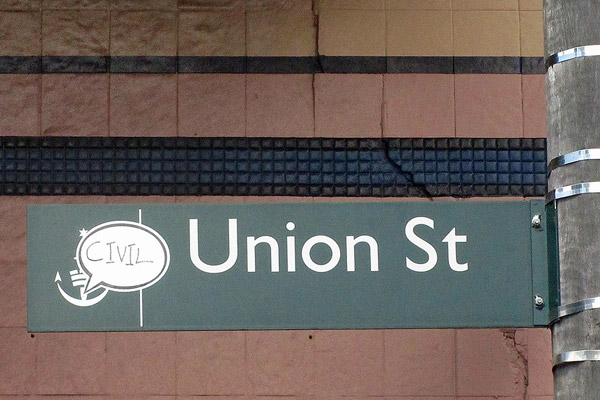
Rookie, the online magazine for teens founded by up-and-coming media mogul Tavi Gevinson, has a good essay by local YA novelist Stephanie Kuehnert on getting bullied in school and getting through it. It'll sound familiar if you weren't one of the cool kids (which, in my experience, no one recalls being), and is well worth passing on to your kids, whether they're bullied or bully:
So for the next two years, I spent all of my allowance on clothes I didn’t even like, let Liza/Brooke/Cassie accidentally-on-purpose burn my forehead when they curled my hair, and fought with my mom constantly because she was holding me back from being “cool” by not letting me see a certain movie or go to a particular slumber party or a group outing to the expensive mall. I also allowed Liza, Brooke, and Cassie to copy my homework and pretended not to know that they were still talking behind my back and calling me and my three actual friends (who were also trying to fit in with them) “weirdos” and “lesbians,” which they knew the meaning of now, but still thought of as an insult.
[snip]
I’m not exactly sure what caused this epiphany. Maybe it was one homophobic remark too many.
This inevitably reminded me of the Washington Post's piece about Mitt Romney's high school years at Cranbrook (which I'd actually heard of, thanks to the battle rap at the end of 8 Mile). It's gotten tons of attention for what it says about Romney. I don't know what it says about him; I'm not sure anyone does who isn't close to Romney personally. But it is an excellent, poignant piece about a time (the 1960s) and a place (an elite private school) and how power, reputation, and social standards intersected.
John Lauber, a soft-spoken new student one year behind Romney, was perpetually teased for his nonconformity and presumed homosexuality. Now he was walking around the all-boys school with bleached-blond hair that draped over one eye, and Romney wasn’t having it.
“He can’t look like that. That’s wrong. Just look at him!” an incensed Romney told Matthew Friedemann, his close friend in the Stevens Hall dorm, according to Friedemann’s recollection. Mitt, the teenage son of Michigan Gov. George Romney, kept complaining about Lauber’s look, Friedemann recalled.
What followed was a charged physical assault. It was cruel, and it wasn't isolated—not with Romney, but not with the students, either (emphasis mine):
In an English class, Gary Hummel, who was a closeted gay student at the time, recalled that his efforts to speak out in class were punctuated with Romney shouting, “Atta girl!” In the culture of that time and place, that was not entirely out of the norm. Hummel recalled some teachers using similar language.
The Cranbrook of the 1960s was a place where students could get away with physically terrifying a closeted gay classmate, and harrassing one in class in the manner of their teachers, but a student (the target of the attack) could be kicked out for smoking a cigarrette.
This is where the importance of legislation like the North Carolina gay marriage (and civil union) ban takes on an importance beyond itself. Our institutions signal what's wrong and what's right, just as Cranbrook and its teachers signaled what sort of intolerance was to be tolerated. It's not just a matter of who can get married to whom; it's a matter of how people relate to each other on an even more basic level.
Photograph: Newtown graffiti (CC by 2.0)



Comments are closed.